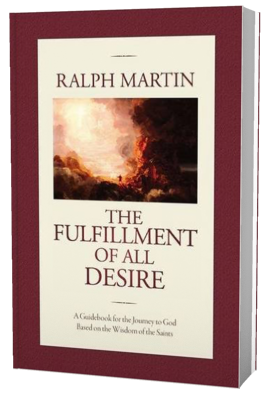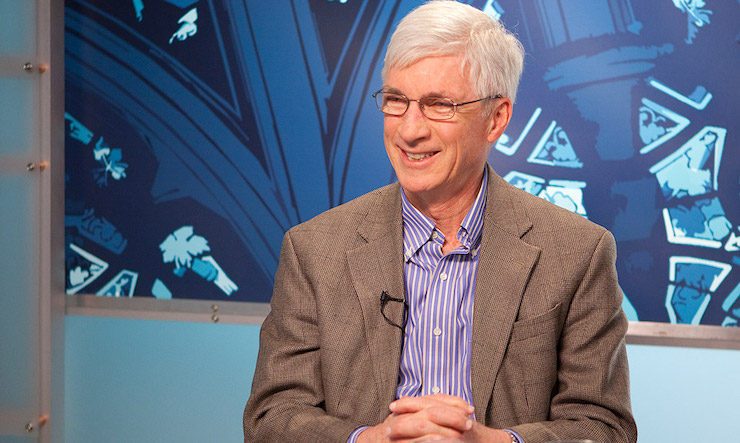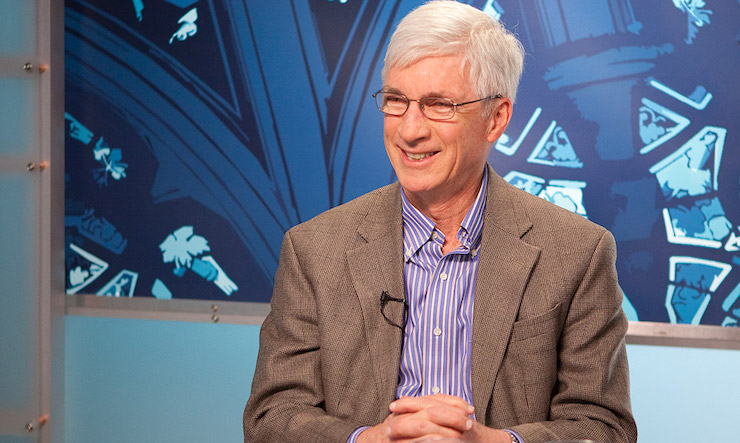Ten years ago, when Dr. Ralph Martin published The Fulfillment of All Desire (Emmaus Road Publishing, 2006), he thought he would produce a helpful guide to the Catholic spiritual tradition that perhaps a few thousand people would use.
Little did he know it would become a modern spiritual classic.
 The book is one of the bestselling Catholic books of our time and has been hailed by cardinals, bishops, and spiritual teachers as one of the best guides to prayer. (Read Msgr. Charles Pope’s recent blog post on the book, titled “If you’re looking for a book on prayer, get this one first.”)
The book is one of the bestselling Catholic books of our time and has been hailed by cardinals, bishops, and spiritual teachers as one of the best guides to prayer. (Read Msgr. Charles Pope’s recent blog post on the book, titled “If you’re looking for a book on prayer, get this one first.”)
In addition to writing this, and several other books, Ralph is the president of Renewal Ministries, an organization devoted to Catholic renewal and evangelization. Renewal Ministries is the sponsor of “The Choices We Face” a widely viewed weekly Catholic television and radio program distributed throughout the world.
Ralph is also the Director of Graduate Theology Programs in Evangelization and an associate professor of theology at Sacred Heart Major Seminary in the Archdiocese of Detroit. He holds a doctorate in theology from the Angelicum University in Rome.
Pope Benedict XVI appointed Ralph as a Consultor to the Pontifical Council for the New Evangelization. He was also appointed as a peritus for the Synod on the New Evangelization which was held in Rome in 2012.
Today, I sit down with Ralph to discuss his classic book and the stages of the spiritual life. Enjoy!
BRANDON VOGT: When you first published The Fulfillment of All Desire ten years ago, did you think it would take off the way it did? It’s now the bestselling book ever published by Emmaus Road, and it has endorsements from several bishops, priests, theologians, and scholars (many of whom say it is their favorite spiritual book). What was your hope when you first released it?
Dr. RALPH MARTIN: I hoped it would make accessible the best wisdom the Catholic Church has on the spiritual journey—the wisdom of the Doctors of the Church in the area of spirituality—that is often inaccessible to the average Catholic who has a hard time making sense out of some of the terminology and style of these writers.
I also hoped that it would transcend the isolation of the various schools of spirituality—Carmelite, Dominican, Salesian, Benedictine, etc.—and show how at heart they are all talking about the same thing, the transforming work of the Holy Spirit in the human person, and yet how each can bring to the table unique insights that very helpfully fill in the “map.” I hoped to create a comprehensive “map” for the journey from baptism to the beatific vision—coordinating, clarifying, organizing—the best insights these great saints have to offer.
I hoped it would be a help to many but when one of the initial reviewers, a former president of the University of St. Thomas in Houston, declared that it would become the standard textbook on Catholic spirituality, “for years to come.” I thought that was somewhat unbelievable and unattainable. And yet now I’ve heard from professors and novice masters and mistresses from more than 25 colleges, universities, seminaries, and novitiates that they are using the book as a basic text.
I’m happy about that but I was even happier when I heard from someone with an 8th grade education who said that the book had transformed his life, and from many ordinary people who are using it for spiritual reading, study groups, and the like.
BRANDON VOGT: In the book, you explore many topics and lessons, but it’s essentially a roadmap to God. It can help people at all points along the journey, whether you’re a beginner in prayer or have been praying for many years. I like the “guidebook” language, because it implies it’s difficult to find the right path on our own. Why is it important to look to others and tap into this rich spiritual tradition? Why can’t we just push forward on our own?
Dr. RALPH MARTIN: We can just push forward on our own, but when we do that, we often run into difficulties that sorely tempt us to give up. We’re also more vulnerable to the many subtle (and not so subtle) deceptions that the world, the flesh, and the devil regularly throw our way.
Many people who are serious about the spiritual life hit a “plateau” or a “ceiling” where they think they’ve gone as far as they can and become either resigned or complacent about the place that they’ve gotten to. They may have run into what they feel are fatal weaknesses that will forever limit their progress. One of the great blessings of the wisdom of these saints is that all witness to the fact that there is a great deal more that the Lord wants to give us in our relationship to him, and that it is truly possible for each one of us to keep going, never stopping, always yielding our life to the Lordship of Christ, the Love of the Father, and the guidance of the Holy Spirit.
Not only do these saints increase our desire and deepen our hope for deeper union with God but they precisely identify those things that hold us back and what we can do to dispose ourselves for God’s grace to overcome them.
BRANDON VOGT: In the book, you draw on the teaching of seven spiritual masters. Who are these figures?
Dr. RALPH MARTIN: Since life is short, and the world is full of spiritual writings and advice, I thought I should “start at the top” and spend my time studying the best the Church has. That led me to the Doctors of the Church, which include certain saints it has recognized who have been given a depth of wisdom by God useful for the whole Church.
There are only 36 Doctors of the Church. Some have been given that title because of their great contribution to systematic theology, such as Thomas Aquinas; some for their contribution to moral theology, such as Alphonsus Liguori; some for their commentaries on sacred scripture, such as John Chrysostom. But some have been recognized because of the deep wisdom God has given them to grow in the spiritual life.
The ones whose wisdom I integrate in an orderly, understandable way in my book are:
- St. Teresa of Avila
- St. John of the Cross
- St. Thérèse of Lisieux
- St. Bernard of Clairvaux
- St. Catherine of Siena
- St. Francis de Sales
- St. Augustine
BRANDON VOGT: The book is arranged in three parts which correlate to three stages in the spiritual life. Can you give us an overview of each stage?
Dr. RALPH MARTIN: These stages have in traditional spiritual literature been referred to as the purgative, illuminative, and unitive stages (or ways). A simple way of understanding this is to think of them as the beginning, middle, and the end of the spiritual journey.
I try to avoid technical language as much as I can and put things in ordinary language to make these teachings more accessible. As someone recently told me: “You break down the teachings of these saints without watering them down.”
The purgative way deals with initial conversion, repentance, turning away from sin, avoiding beginning temptations, establishing a good order and balance in our life.
The illuminative way deals with growing in union with God, growing in love of neighbor, growing in virtue, deepening our prayer, allowing God to free us from disordered attachments and the like. Part of the purification that this stage eventually leads to is characterized by John of the Cross as “dark nights” and I devote several chapters to unpacking the meaning of these purifying experiences and point out the tremendous joy and freedom on the “other side” of the dark nights.
The unitive way comes usually after a good number of years of seriously living the spiritual life and deep purification and is characterized by a habitual joy, freedom, and apostolic fruitfulness.
BRANDON VOGT: Some of the book’s lessons are expected, things like cultivating a daily prayer life, regularly reading Scripture, etc. But what are some lessons the saints give that might be a bit surprising or outside-the-box?
Dr. RALPH MARTIN: My favorite chapter right now is chapter 10, “Growing in Freedom,” which deals with the amazing insights the saints have into how we often wrap our souls around things seeking, from them a happiness, peace, security, pleasure, that only a life under the Lordship of Christ can give.
These saints have amazing insights into how concerns about our appearance, reputation, money, our health, sexuality, possessions, relationships, entertainment, and so many other things as well can greatly slow down the process of transformation
And yet their wisdom is no harsh wisdom that tells us to be “detached” from all these things “right away,” but by virtue of the beautiful truth they show to us we find ourselves receiving the grace to allow these things to take their rightful place in our life, under the rule of the Spirit—or as St. Bernard of Clairvaux describes it, allowing the Lord to put our loves in order.
As Jesus once said: you will know the truth and the truth will set you free!



